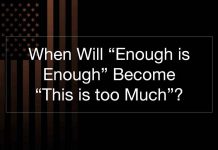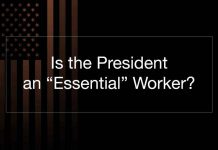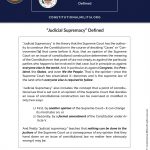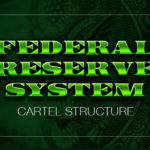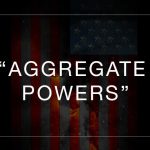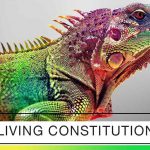Last Updated on March 21, 2022 by Constitutional Militia
Time runs out for every one and every thing. The sand in the hourglass is draining particularly quickly, though, for America’s present monetary and banking systems. One need not be a bloodhound to sniff the scent of crisis in the air.
Inasmuch as the monetary and banking systems are the creatures of politicians in Washington, D.C., and as a matter of law are totally subject to their control, the natural inclination of all too many Americans is to presume that the Wise Men on the Potomac will take timely and thorough action either to prevent a crisis from breaking out at all, or (if a crisis proves to be unavoidable) to protect common Americans from financial ruin and to preserve this country’s national independence and free institutions. Such thinking, however, is dangerously naive–and may possibly prove fatal.
Under present conditions, the General Government will not provide a proper solution to a monetary and banking crisis, because the denizens of the Capitol, the White House, and the Treasury are the primary perpetrators of the problem. True, as a matter of law the Constitution delegates to the General Government plenary power to reform the monetary and banking systems—to reintroduce silver and gold as the government’s exclusive media of exchange, to separate bank and state, to prohibit or strictly regulate the inherently fraudulent practices of fractional-reserve banking, to withdraw the United States from all international and supra-national monetary and banking schemes, and so on. But law and fact are two different matters.
All the legalities of We the People’s Constitution are beside the point because, as a matter of fact, the General Government is no longer We the People’s obedient agent. Rather, it is the tool of America’s Establishment. Of course, this conglomerate of high finance, big business, officials of organized labor (especially among public-sector employees and public-school teachers), the neo-Marxist intelligentsiia in academia and the media, and a myriad of special-interest pressure-groups (the so-called “nongovernmental organizations” that propose to solve every problem with more governmental intervention) can claim no legal authority to control the General Government. That authority remains—at least on paper—in We the People’s hands. Nonetheless, the Establishment enjoys the ability in fact, time and again, to place its minions in the most important positions of political power. That being so, it is as sure as death and taxes that, absent a political renversement in this country, the General Government will continue to do the Establishment’s bidding.
Nowhere will the Establishment demand the General Government’s lap-dog subservience more than with respect to money and banking. For the Establishment’s power in every domain largely depends upon its control over—and ability to draw unearned profits from—the coffers of money and banking. (Always remember that the two greatest powers of government are “the power of the purse” and “the power of the sword”. Control over one very often results in control over both.)
The Establishment did not originally gain power in this country, and certainly has not maintained its dominant position through thick and thin, by blinding itself to salient facts. Doubtlessly, therefore, the Establishment understands full well that America’s present monetary and banking systems are inherently and fundamentally flawed, and becoming increasingly unstable—and that some sort of crisis is inevitable, unavoidable, and probably impending. Doubtlessly, too, the Establishment realizes that no amount of competence in the supposedly “expert” officials in the Federal Reserve can for much longer “manage” the Ponzi scheme they administer. (Actually, any reliance on supposed “competence” in such people would be misplaced in any event. No amount of competence in central planners can solve the problem of the absence of rational economic calculation inherent in socialism. Therefore, simply by being fractional-reserve central bankers, and to that extent central planners, these people demonstrate their incompetence.) The Titanic was designed to be unsinkable, but nevertheless sank. In the long run, no scheme of fiat currency ever launched has failed to sink, no matter how it was designed, or on what course it sailed. So why should anyone—especially the Establishment, which selects the ship’s captain, officers, and crew—believe that the Federal Reserve System is not bound for the bottom, too?
That being the case, what is the Establishment—and, at its behest and for its benefit, the General Government—ikely to do? The Establishment will do whatever is necessary and sufficient to maintain its iron-fisted control over money and banking, whether that entails attempting to preserve the regime that now exists, or bringing some entirely new scheme into existence, and no matter how much in treasure—and lives—such maneuvers may cost everyone else.
The Establishment recognizes that one increasingly serious pathological symptom of Ponzified political currency and fractional-reserve banking requires timely treatment: the burden of supposedly unpayable debt the General Government has assumed, and far too many Americans are carrying in their personal lives. “Supposedly” is the key adjective here, because all debts are always paid–if not by the debtors, then by the creditors or by some third parties. And a clever device for paying debts that are unpayable in real terms is to pay them in the false values of depreciated currency. (For example, a debt of $100 contracted when $100 of Federal Reserve Notes bought X units of commodities in the free market, but paid off when $100 of Federal Reserve Notes buy only X/2 units of commodities, effectively shifts 50% of the real value of the debt to the creditor through his loss of purchasing power.) Thus, the Establishment might initiate several rounds of Latin-American style inflationary destruction of Federal Reserve Notes. In each of these it would generate a new fiat currency in the guise of “stabilization”: say, a red Federal Reserve Note introduced at an exchange rate of 1 red for 10 green, then a blue Federal Reserve Note introduced at an exchange rate of 1 blue for 100 red, and so on, through various orders of magnitude of depreciation of one currency and substitution of another. (Inasmuch as currency shell-games of this kind have worked repeatedly in such sophisticated countries as Argentina and Brazil, nothing precludes their being utilized here, where ignorance about money, banking, and the Constitution is widespread.) The Establishment could also employ such serial destruction of a rainbow of Federal Reserve Notes to compel Americans, driven to desperation by monetary depreciation, to accept a new world reserve fiat currency as their medium of exchange. This would strip Americans of the last vestige of sovereignty over the currency they use, reducing them to financial vassals of some foreign or supra-national central bank.
Also not beyond the realm of possibility would be for the Establishment to trigger (or simply do nothing to prevent) the collapse of the monetary and banking systems in a full-blown depression, coupled with acts of aggression (so-called “preemptive strikes”) by the General Government’s armed forces overseas that ignite a world war. Properly managed, a depression and world war would result in massive redistribution of real wealth from common Americans to the Establishment and its clients, while the victims found themselves so severely regimented by the General Government’s exercise of wartime “emergency” powers that they could not effectively complain. One need not be overly suspicious to suggest a sequence that history already partly bears out: World War I, the League of Nations, and the undermining of the international gold standard—followed by World War II, the United Nations, the adoption of Federal Reserve Notes as the world’s reserve currency, and the “demonetization” of gold and silver as currencies—followed by World War III, a New World Order based on the tripartite division of the globe into European, American, and Asian blocs, and a supra-national world central bank emitting a world fiat currency.
A strategy based upon intentionally bringing about a depression is perhaps unlikely, however, because a depression is extraordinarily destabilizing, economically, socially, and politically. Once the bottom falls out of the economy, no one can be sure that desperate people with nothing to lose will not follow radical leaders whom the Establishment cannot co-opt, control, or center in the cross-hairs of some “lone gunman” who amazingly wields an inaccurate Mannlicher-Carcano rifle with Olympic precision. Yet such a strategy is not impossible (and may be necessary if the Establishment foresees a depression as unavoidable)—which perhaps explains why the General Government is so assiduously militarizing State and local police forces throughout the country, under the guise of integrating them into a national program of “homeland security”.
In any event, two things the Establishment—and the General Government, while it remains under the Establishment’s thumb—will never do of their own free will: (i) return the United States to constitutional money of silver and gold, and (ii) eliminate or severely regulate the inherently fraudulent practices of fractional-reserve banking. But one thing the Establishment will always do: deploy the General Government to stab in the back any attempts at true monetary and banking reform—thus prolonging the present mess beyond any hope of rectification along the lines of sound money, honest banking, individual freedom, and national independence. Such, after all, is the pellucid lesson American history teaches: At every crucial point since the outbreak of the Civil War–1862-1864 and 1871 (emission of the first United States fiat currency and creation of the National Banks), 1913 (creation of the Federal Reserve System), 1933-1935 (destruction of the domestic “gold standard”, and repudiation and prohibition of obligations payable in gold), 1964 and 1967-1968 (debasement of silver coinage and repudiation of paper currency redeemable in silver), and 1971 (destruction of the international “gold standard”)—Congress, the President, and the Judiciary have wrapped this country more securely than before in the coils of unsound money and dishonest banking, both domestically and internationally–while at the same time enabling the Establishment to exert an ever greater, ever more pernicious influence over every American’s economic and political life.
Have the American people no recourse, then? Is this country not a “democracy”? Cannot political action at the “grassroots” level force politicians to reform the monetary and banking systems before it is too late? Unfortunately, the answer is “probably not”, for several reasons.
First, America is no “democracy”. The Constitution—which is the definitive authority on the nature of government in this country—provides that “[t]he United States shall guarantee to every State in this Union a Republican Form of Government”. Article IV, Section 4. A “Republican Form of Government”, not a “democracy”. And the complex structure of the General Government plainly reveals that it is no simple “democracy”, either. The Establishment’s mouthpieces constantly harp on supposed “democracy” in this country in order to confuse Americans into believing that they have somehow agreed to whatever elected officials choose to do. In a constitutional republic, though, even if an individual votes for a particular politician, he does not thereby agree with, and is not bound by, that politician’s later unconstitutional acts in office, because such illegal acts are beyond any officeholder’s authority. Moreover, no citizen in a constitutional republic has any right to vote for any politician knowing and intending that he will misuse public office to violate the Constitution. Such a vote constitutes participation, not in “democracy”, but in a criminal conspiracy. Thus, if true reform is possible at all, it must come through Americans’ intentional enforcement of the Constitution, which will require even more thinking than voting.
Second, when electoral push comes to shove, all too many Americans will vote against the Constitution from crass self-interest. Aside from members of the Establishment themselves (a small number), and individuals who directly profit from (or at least believe that they profit from) fiat currency and fractional-reserve banking (a larger number), a great many people vote for the Establishment’s Bolshevik and Menshevik candidates because of the governmental benefits these politicians promise them. Such people may know nothing about the Federal Reserve System; but the candidates they elect understand perfectly well that they cannot deliver ever-increasing benefits unless the central bank can open the spigots of fiat currency on demand (primarily, through monetization of public debt) whenever necessary.
Third, many other Americans will never even consider a constitutional solution to this country’s monetary and banking problems, because they are totally unaware that any such problems exist, or that the Constitution provides the necessary solutions. The Establishment has been remarkably successful in banishing the fundamental economic and legal issues of money and banking from political debate, and in defaming and demonizing advocates of strict constitutionalism in general, and of sound money and honest banking in particular.
Fourth, even if patriotic Americans can overcome these obstacles before a crisis breaks out, they must still work out the difficult arithmetic of electoral success. To reform the monetary and banking systems along constitutional lines will require that Congress enact new legislation. So, patriots must elect a veto-proof Congress (two-thirds of each House), or a majority in both Houses plus a free-market, constitutionalist President, or (better yet) both. See Article I, Section 7, Clause 2.
A mere majority in both Houses of Congress, even along with a sympathetic President, though, may not be enough. True, in Section 30 of the Federal Reserve Act of 1913, Congress reserved the right “to amend, alter, or repeal” the Federal Reserve System at any time. Statutes at Large, Volume 38, page 275. But the bankers will fight with ferocity and fanaticism any attempt to strip them of their special privileges. And the Establishment’s kangaroo judges will bend their every dishonest effort to throw up legalistic roadblocks. Therefore, reform will require Congressional majorities sufficient to impeach, convict, and remove the black-robed miscreants—which means a majority in the House of Representatives and two thirds of the Senate. See Article I, Section 2, Clause 5, and Article I, Section 3, Clauses 6 and 7.
What is the likelihood of achieving any of these necessary goals in the near future? Perhaps not so vanishingly small as to condemn the attempt as impossible. DVM SPIRO SPERO. Yet small enough to question its plausibility or practicality, and to compel a search for viable alternatives that can be put into operation now.
Americans must face the hard fact that, as far as money and banking are concerned, this country and the political class that misrules it have come to a final parting of the ways. A basic principle of American political jurisprudence is that
[a]ll [citizens] alike owe allegiance to the government, and the government owes to them a duty of protection. These are reciprocal obligations, and each is a consideration for the other.
United States v. Schwimmer, 279 U.S. 644, 649 (1929).
The reality of Americans’ political existence, however, is that the politicians who run the General Government demand “allegiance” (or at least obedience) in everything, but provide no “protection” from their own unconstitutional acts. Rather than fulfilling their “duty of protection”, they daily search out new opportunities for predation and oppression. The present relationship between citizens and the General Government, then, is one, not of “reciprocal obligations”, but of imposed superordination and subordination–not only a failure of political “consideration”, but also what the Declaration of Independence denounced as “a long train of abuses and usurpations, pursuing invariably the same Object [that] evinces a design to reduce the[ American people] under absolute Despotism”.
A basic principle of American constitutionalism is that “[a]n unconstitutional act is not a law; it confers no rights; it imposes no duties * * * ; it is, in legal contemplation, as inoperative as though it had never been passed”. Norton v. Shelby County, 118 U.S. 425, 442 (1886). See to like effect Huntington v. Worthen, 120 U.S. 97, 101-02 (1887); Ex parte Siebold, 100 U.S. 371, 376 (1880); Fay v. Noia, 372 U.S. 391, 408 (1963). Americans owe no allegiance, let alone obedience, to unconstitutional acts or to the criminals who perpetrate them. See Title 18, United States Code, Sections 241 and 242.
Therefore, if before a monetary and banking crisis breaks out Americans cannot remove the individuals who befoul the offices of the General Government, they must find other ways—always, of course, within the Constitution—to protect themselves and their country while there still may be time.
©2005 Edwin Vieira, Jr. – All Rights Reserved.





























